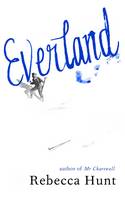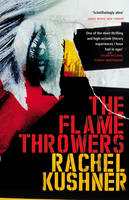Rebecca Hunt, Everland (2014)
 The author of 2010’s Mr Chartwell returns with a tale of polar exploration. In March 1913, three men embark on an expedition to an uncharted Antarctic island which is being dubbed ‘Everland’ – a journey that we know won’t end well, as we’ve already seen others of their ship’s crew go after the men a month later, and find only one alive. In 2012, the men’s expedition has become famous, and three researchers set out from their base on their own trek to Everland. Over time, the two expeditions start to parallel each other – subtly at first, then more overtly, in terms of both events and the frictions that develop within each group. Hunt places her characters in a situation where they’re trapped by their environment, then uses the parallels between the two groups to underline just how much they are trapped.
The author of 2010’s Mr Chartwell returns with a tale of polar exploration. In March 1913, three men embark on an expedition to an uncharted Antarctic island which is being dubbed ‘Everland’ – a journey that we know won’t end well, as we’ve already seen others of their ship’s crew go after the men a month later, and find only one alive. In 2012, the men’s expedition has become famous, and three researchers set out from their base on their own trek to Everland. Over time, the two expeditions start to parallel each other – subtly at first, then more overtly, in terms of both events and the frictions that develop within each group. Hunt places her characters in a situation where they’re trapped by their environment, then uses the parallels between the two groups to underline just how much they are trapped.
Tamara Astafieva, Born in Siberia (2014)
Translated from the Russian by Luba Ioffe
Born in 1937, Tamara Astafieva became a television editor for the Soviet press agency, Novosti. This book is a collection of autobiographical essays (and the occasional poem) sent by Astafieva a few years ago to an old acquaintance, British TV director Michael Darlow (who also provides linking commentary throughout). Born in Siberia illuminates a time and place in history that I personally didn’t know about; and Astafieva comes across as a bright, charismatic personality who is a pleasure to meet through the pages of her book.
Graham Greene, The Quiet American (1955)
This was my book group’s latest choice: the tale of Thomas Fowler, a British journalist working in Indochina, and the idealistic American Alden Pyle, who believes that the war can be ended with a ‘third force’. Reading The Quiet American was an unusual experience for me, as I saw the film back in 2002, but don’t remember much about it; so the book kept snagging on shadowy memories. I often find it difficult to get into books written in the 1950s and earlier (I don’t know why; a cultural distance that’s hard for me to cross, perhaps); and this was true for Greene’s novel to an extent – though I appreciated its nuanced exploration of morality; and the ending could still shock me, even though I knew what was coming.
Carlos Busqued, Under This Terrible Sun (2009)
Translated from the Spanish by Megan McDowell, 2013
I said to myself that I would only buy an e-reader if I felt that I were truly missing out on ebooks that I wanted to read. I finally reached that point when I started hearing about publishers like Frisch & Co., a Berlin-based who specialise in digital works in translations; and my first electronic title is one of theirs.
Under This Terrible Sun (the first novel by Argentinian writer Busqued) begins as Javier Cetarti – who does little more than lounge around his apartment watching documentaries – learns that his mother’s lover has killed her, and Cetarti’s brother. The bearer of this news, Duarte, has an idea to cash in on a life insurance policy, and Cetarti is happy to play along. But Duarte has darker motivations than Cerarti realises. Busqued’s novel works almost by stealth: the characters will drift along for a while; then something sinister or violent will intrude – unbidden at first, then with growing tension, until… ah, but that would be telling.
Rachel Kushner, The Flamethrowers (2013)
In 1977, Reno (not her real name, but it’s as much as we’ll get) heads east on her motorcycle to New York, where she becomes involved in the art scene. A relationship with an Italian artist leads her to Milan, where a more political revolution is taking shape. The Flamethrowers is a long novel, dense with incident; yet in some ways Reno’s narrative voice remains detached from it all. Kushner‘s novel reflects on performance, and finds it in all the worlds through which Reno moves – and not always to the good. The ending manages to be poignant, chilling and optimistic all at once.
Emma J. Lannie, Behind a Wardrobe in Atlantis (2014)
Mantle Lane Press is a new small publisher focusing on short volumes by writers with an East Midlands connection. This, Mantle Lane’s second book, is a set of eight short stories by Derby-resident Emma J. Lannie. Lannie’s stories are snapshots of characters at key emotional moments, and are shot through with flashes of myth or fairytale. So, for example, ‘Rapunzelled’ sees a girl caught in the shadow of her photographer sister as they go on a shoot in an abandoned tower; while the narrator of ‘Not Gretel’ wanders through the forest, leaving her old life behind, in search of… something. This book is an intriguing start to Lannie’s career, and I look forward to reading more from her in the future.

 Winston Churchill famously described his depression as a “Black Dog”; the premise of Rebecca Hunt’s first novel is that there really was a black dog – Black Pat Chartwell, a six-foot-seven talking dog who walks on his hind legs. The events of Mr Chartwell take place in July 1964, in the week running up to Churchill’s retirement from Westminster (and scant months before his death). Black Pat becomes a lodger in the home of Esther Hammerhans, a clerk in the House of Commons library. Just as Churchill is steeling himself for the end of his parliamentary career, so Esther is watching the calendar with trepidation; the two will come together by novel’s end, and the shadowy figure of Black Pat will never be far away.
Winston Churchill famously described his depression as a “Black Dog”; the premise of Rebecca Hunt’s first novel is that there really was a black dog – Black Pat Chartwell, a six-foot-seven talking dog who walks on his hind legs. The events of Mr Chartwell take place in July 1964, in the week running up to Churchill’s retirement from Westminster (and scant months before his death). Black Pat becomes a lodger in the home of Esther Hammerhans, a clerk in the House of Commons library. Just as Churchill is steeling himself for the end of his parliamentary career, so Esther is watching the calendar with trepidation; the two will come together by novel’s end, and the shadowy figure of Black Pat will never be far away.
Recent Comments